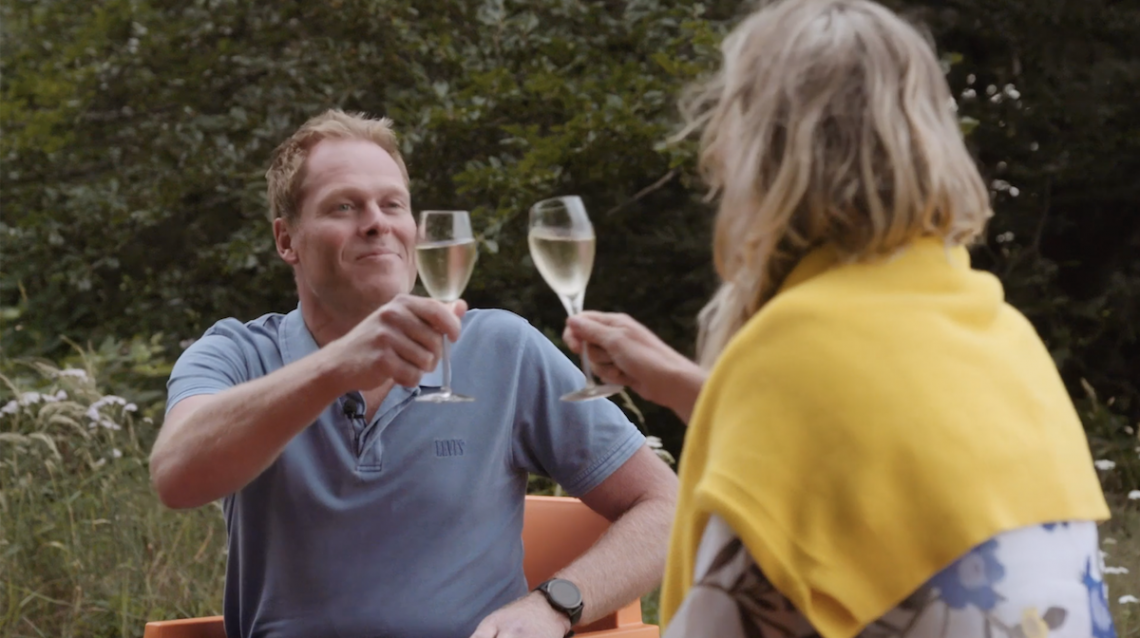An HPP chitchat: Mark van Doorn & Hanneke Diephuis
Blogs, General news, HPP-REDA

Project developers, consultants, aldermen, investors and other decision-makers from the real estate sector… all with a heart for real estate and an even greater passion for bicycles. Last year during HPBike 2021, we invited six of our cyclists to our orange seat for an HPP chitchat. What challenges do they see in the sector? What would they do if they were ministers for one day? And how could they strengthen each other?
Read the interview between decision-makers Mark van Doorn (General Manager, Janssen de Jong Projectontwikkeling) & Hanneke Diephuis (Director, SENSE Vastgoed) below.
Watch the entire video here
For one day, you are the minister of the real estate sector. What would you do right away?
M: I would seriously try to intervene in all the procedures we have in the Netherlands. We’re only getting further away from acceleration because of regulations, for example, how many rights people get. Sometimes there is a project in a village for housing, a primary school or another facility that two out of three hundred people are against. Those two votes then carry much more weight, which is not democratic at all. I think these procedures have gotten a little out of hand.
H: I was on a different track. When I was a minister of real estate, I immediately thought of housing. I would do something for starters. They have a hard time as it is, but our children, the future starters, will have a hard time at all. I think attention should be paid to that.
M: Absolutely, that really is a devil’s dilemma. As project developers, we really want to develop for affordability, for example by prefabricating more and more. Still, it remains extremely difficult to keep things affordable with the rising prices and ambitions.
H: I think diversity is also very important, so not just the same standard houses. That is just as important for starters as for any other target group. That is a big challenge with prefabricated construction.
Hanneke Diephuis: “I think diversity is very important, so not just the same standard houses. That is just as important for starters as for any other target group. That’s a big challenge with prefabricated construction.”
Can you think of a challenge together for future decision-makers in the real estate sector?
M: I’m thinking in terms of raw materials. We are getting increasingly scarce, and at the moment primary raw materials are still cheaper than recycled raw materials. Ultimately, we want to have a circular economy, preferably by 2030, but in any case by 2050. 2050 still seems a long way off, but we will have to work very hard together to deal with materials in that way. But perhaps you have something more important to say? You just mentioned affordability.
H: Yes, I definitely think that sustainability is an absolute must and is very high on the priority list. However, I think the current system does put affordability under pressure. So I think it should be a combination of perhaps the two. People who cannot afford a very expensive house should also be able to buy a sustainable product.
M: The problem is that those two things are both high on the agenda, but that sustainability simply increases the cost price. That is very conflicting. We often see it when we do deals with corporations. Corporations very much want to be sustainable, but then they go back to their core business, which is building affordable housing. It is a dilemma. Some corporations want to be special, some have affordability as a priority.
H: Yes, of course, they are also searching. The fact that they are working on it is already step one.
Mark van Doorn: “We have an illogical patchwork of systems for making a house social. The end result is that you are having unrealistic discussions and negotiating with a corporation and municipality on a project basis. That is not right.”
Now if you wanted to change three things in the sector, what could they be?
H: First of all, I think that there should be more women working in the sector in certain positions.
M: And fewer women in your sector 😉
H: Haha, yes, I know from experience that a diverse team can bring a lot. I’m putting that down to men being men and women being women. We, women, manage projects in different ways. A mix of management in projects would do a lot of good. I would like to see more women in the core of the construction industry, especially in certain positions. Another thing, which you just touched on, is the lengthy procedures at the municipality. I used to develop together with AM and noticed that we were talking to each other on completely different levels in relation to the municipality. That was the reason for me to stop working as a developer.
M: Developing gives you a thick skin. I have an impatient nature, but I have become patient over the years. You have to be persistent.
H: And thirdly, what else should be different?
M: I don’t have so many problems with social housing myself, but I do think there’s something wrong in the Netherlands with how we arrive at social housing. We have an illogical patchwork of systems for making a house social. The end result is that you have unrealistic discussions and negotiations with a corporation and municipality on a project basis. That is not right.
A moment of connection with content that gives offence to a sequel. On Tuesday 5 July, we will be discussing solutions to the problem raised by Mark, namely the lack of central control when it comes to public housing. What agreements should we make to keep public housing as transparent and affordable as possible? And how do we create trust between social parties and the market?